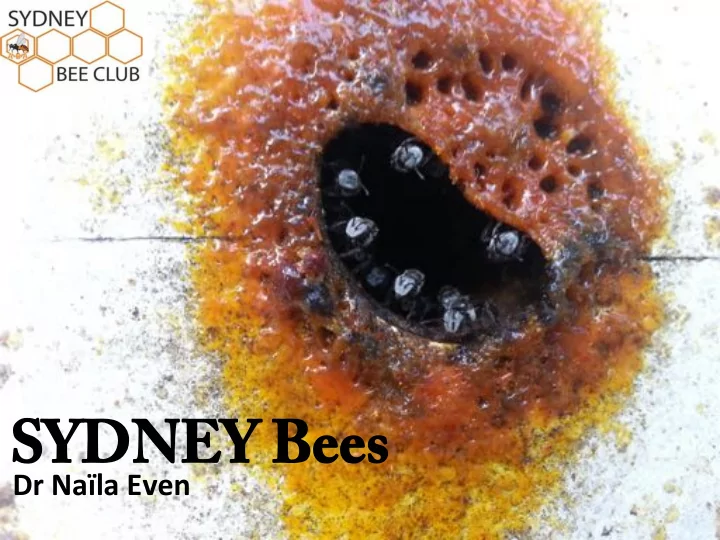

SYDNEY Bees SYDNEY Bees Dr Naïla Even
How well do you know bees and How well do you know bees and Sydney bees? Sydney bees? h(ps://www.zee0ngs.com/sydneybees Honey Bees
-founded by a famous colonel in 1954 -suffered from diploma0c disagreements -survived near death early 200 2000 members -recovery in 2007 -unprecedented growth in the last 5 years Committee 2018
Urban beekeeping in the rise
Committee President: Naila Even Vice President: David Rosen 161 Members, branch created in 2012 by Secretary: Phil Crowley Doug purdie Apiary officer: Olivier Pingot Treasurer: ChrisFne Underhill Vicky Brown Media officer: Vera Sistenich Elke Haege General commiJee members: Doug Purdie Elke Haege Gavin Smith Elizabeth Chapman Gabriele wagner Zoe Thayer Felicity Halo Katy Thompson
Networking community support
Educating through practice
Educating through practice
Collective work
Education from experts
Collaborating with other local communities
Newsletters
Solitary Australian na0ve: domino cukoo
Tetragonula Carbonaria Apis Mellifera European honeybee Na0ve social - S0ngless S0ng and produce a lot of honey! = produce very low honey stores
European bees
Honeybee life cycle
Native bee nest
Food security
Economical Impact Economical impact Bees Pollinate 1/3 of our harvest = 4-6 billions $ per year in Australia Produc0on of: Honey, wax, propolis, royal jelly = 92 million de $
Pollinisa0on
Honey extraction
Honey extraction Honey frames centrifuge filter bucket
( Bees are threatened worldwide except in Australia so far!!) “Colony collapse disorder” (CCD) is directly linked to world globalisa0on of exchange.
Create habitats
Plant fm owers
Thank you !
Better apiculture through knowledge 1-increase the knowledges of bees and bee culture 2-improve the standard of beekeeping among beekeepers and to encourage the forma0on of branches 3-assist the study of subjects allied and relevant to apiculture 4-foster intelligent observa0on and prac0cal handling of bees 5-afford advice and assistance to beginners 6-to arrange lectures, discussion, demonstra0ons and field days for the benefit of members 7-to assist members in the acquisi0on of suitable apicultural literature and equipment by purchase or loan from the associa0on 8- to seek and assist people who are interested and qualified to carry out research work on bees and bee culture, and to arrange for assistance in the recogni0on, control and treatment of disease affec0ng bees. 9-to protect the honey and pollen flora and the interests of beekeepers 10-to encourage observance of the apiaries act and regula0ons 11- to publish a news bulle0n at regular intervals to include the details of mee0ngs and other relevant informa0on.
Recommend
More recommend